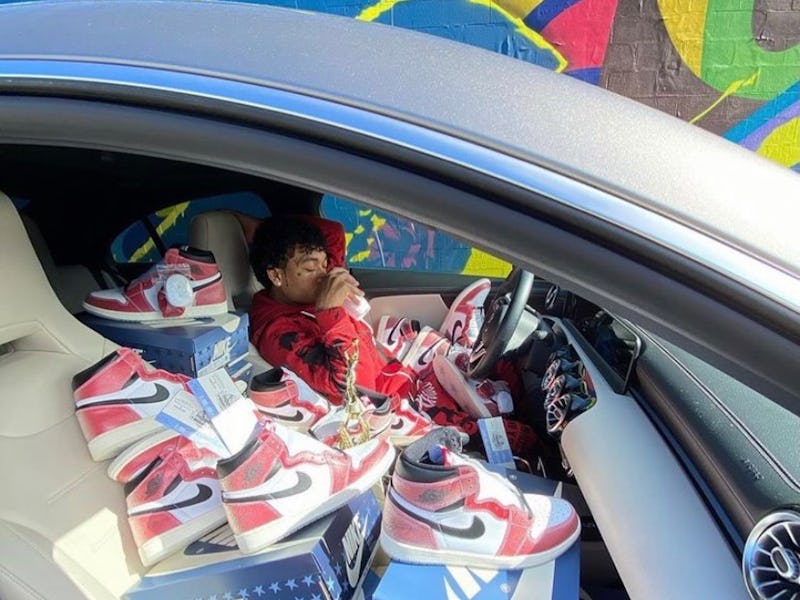Style
This is why you can't get the hyped Nike and Jordan sneakers you want
How is Nike still allowing resellers to stockpile its most coveted drops?

Even when the Nike SNKRS app is fully operational, which is far from a given, anyone attempting to buy a coveted pair of sneakers knows the odds are stacked against them. Supply is always scant compared to demand, and the whole game is essentially harder to win than the Powerball lottery.
Making matters worse is the prevalence of buyers who have no interest in owning the shoes, whose sole goal is to sell them at an upcharge to someone who was unfortunate enough to miss out on any given sneaker's original drop. Knowing that a good portion of your competitors is only in it for a quick profit spoils a lot of the fun and steals away all hope — a feeling that's only amplified when you see the braggarts on social media posting stockpiles of a single sneaker that rivals entire collections in quantity.
If you're active in sneakers social media, you know the image. A young man, probably younger than you, poses with his spoils or showcases a brick wall of sneaker boxes that rivals a fraternity's supply of 30 racks. You wish just one pair could be yours, and you know that you're looking at thousands of dollars in profits. You may also wonder how the hell it is they accumulated so many of the sneakers that most people can't even land a single pair of.
Here we go again — We're seeing this familiar phenomenon play out once more with the upcoming Trophy Room Air Jordan 1s. Numerous Instagram accounts have posted their stashes of the glittery sneaker, and a nontrivial number of them are bound to be fake (which presents a whole other problem). Still, some of the accumulated sneakers are indeed authentic — and we have to ask how Nike is still allowing this to happen?
The problem of resellers gobbling up sneakers before they go on sale isn't unique to Nike — you see it happen frequently with Adidas' Yeezy line — but because the Swoosh is the clear leader in hype, its shoes are the most commonly amassed. Nike is also the leader in the market, a company whose reach knows few limits across the world and is valued at an estimated $35 billion.
How can such a powerful company allow individuals to acquire its goods and form what are, in essence, unauthorized retailers untethered to Nike's MSRP? Beyond isolating Nike consumers, these hawkish resellers are profiting handsomely off of Nike's name, which should be more than enough motivation to stamp out the process.
Part of the blame has to be put on individual retailers who've allowed the practice of "back-dooring." The phrase refers to stores selling off their stock to individuals before the public has a chance to purchase. But even if Nike doesn't condone "back-dooring," it needs to do more to stop it.
[Nike] hasn't stamped out the misdeeds happening right under its nose.
I have a hard time believing such a massive corporate entity is powerless to reign in the extracurricular activity of its stockists. If Target can form a facial database for shoplifters, why can't Nike prevent its retail partners from making unauthorized sales en masse? Nike has no problem sending a blitz against counterfeiters and bootleggers, and yet it hasn't stamped out the misdeeds happening right under its nose.
Even SNKRS can be gamed — Resellers without a retail connection can also beef up their stock by running an army of devices to purchase as many pairs as possible, or simply using shopping bots to purchase pairs faster than humans can. These digital operations tend to be quite sophisticated, utilizing different accounts as well as VPN and proxy servers to conceal the number of attempts from one location. If numerous pairs were shipped to, say, one particular household, that would have to raise red flags at Nike, so there must be a network of mailboxes to ward off scrutiny, too.
But again, we're talking about Nike. Certainly, it has the manpower to fight these small enterprises, however advanced they are. And even if subterfuge is enabling the purchases, many resellers are bold enough to share their bounty for the world to see. If these showboating posts are coming across my feed on the regular, why in the world isn't Nike throwing its investigative might against these flagrant bad actors?
Maybe Nike just doesn't care. A sale is a sale, and whatever happens afterward has little financial effect on its bottom line. But Nike is also the king of narratives in sneakers — and the story forming on the secondary market makes many of us want to give up on the first.
People will always find a way to game the system. We just wish Nike made more of an effort to build a wall against them. Instead, the greatest barrier sits between the haves and have-nots. And built on fairness, it sure as hell is not.